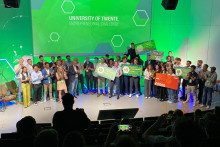Compared to previous years, the number of new spin-offs was slightly lower. In 2023 there were five, in 2022 six, and in 2021 five again. In 2020 there were two. In 2024, Phos4Nova B.V., Flawless Flow Pumps B.V. and Twente Medical Optics B.V. were founded.
Phos4Nova develops stable and biologically safe polymers (molecular chains). These can aid in drug absorption and improve the visibility of contrast agents in MRI scans, enabling doctors to interpret images more effectively.
Flawless Flow Pumps manufactures magnetic blood pumps for patients with heart problems. Because there are no moving parts, unlike in traditional pumps, patients experience fewer blockages and less shear stress, which also reduces the need for medication. The new design also requires significantly less maintenance.
Twente Medical Optics produces handheld laser perfusion imagers (HAPIs)—portable laser scanners that allow doctors to measure skin blood flow in burn patients. Good blood flow is a reliable indicator of whether a skin graft has been successful. Existing solutions were either too large for use in the operating theatre or too polluting and risky.
What does the UT gain from this?
The University of Twente (UT) can support spin-offs with expertise and research, helping to further improve inventions and ensure they meet the various requirements for inspection and certification. In return, the UT may request shares in the company, entitling it to a share of the profits. These shares are managed by University of Twente Holding (UTH). The UTH portfolio now contains 44 spin-offs, in which the UT holds varying percentages of shares.
In some cases, the UT is not a direct shareholder but participates via a separate, shared holding company set up specifically for that spin-off. As a result, the percentages listed in the annual report can sometimes give a distorted picture: they may show the stake in the holding company rather than in the spin-off itself. The 53 per cent share in NociTrack—the highest figure in the annual report—is an example of this.
Since 2023, the UT has adhered to the deal-term agreements set by Universities of the Netherlands (UNL), which stipulate that universities should not own more than 25 per cent of the shares in any company. One reason for this is to avoid discouraging entrepreneurial academics.
Knowledge subscriptions
Some UT discoveries do not immediately lead to spin-offs but can still help existing companies progress. In such cases, the UT may choose to sell the knowledge or license it, allowing the party making use of it to pay a periodic fee. In 2024, the UT sold 14 such “subscriptions”, generating just over 200 thousand euros in revenue last year.
In addition, the UT invests in venture capital funds. Examples include DeepTechXL, as well as Istart.nl, Photon Ventures and Shift Invest Coöperatief. These venture capital funds target innovative and fast-growing companies, particularly in the high-tech sector, which are often considered too risky for traditional investors. DeepTechXL specialises in photonics, quantum computing, nanotechnology and semiconductors.
How does a spin-off come about?
Researchers are constantly engaged in studies—for example, in biomedical technology or nanochip development. When someone discovers a technology that can benefit society while also generating revenue, there may be a need to develop it on a larger scale. Often, the researcher lacks the time and funding to do this themselves, and not every scientist is commercially inclined. By creating a separate company and attracting investors, the idea can be brought to market.






